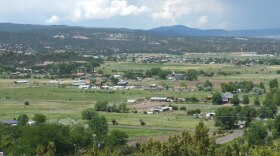The Navajo Nation is one of the hardest hit areas by coronavirus in the United States. That presents a grim reality for funeral homes during this crisis. The Navajo Nation has a burial assistance program that helps tribal members with some funeral costs, but of the 11 mortuaries that participate, only two are located in Arizona. The Valley Ridge Mortuary in Tuba City has had to bring on more staff and add a temporary storage unit due to the death toll. KNAU’s Melissa Sevigny spoke with the mortuary’s director Michael Begay about the emotional impact on himself and his staff.
How have things changed for you since this pandemic began?
It has been a big change for families we serve, because our culture is built on clanship, and we’re pretty close as far as socializing and meeting and being with people and supporting one another in a time of loss. That’s really changed. We just do graveside services now, we advise families 10 or less people…. I can’t really imagine what these families go through, especially not only losing one family member but multiple family members at one time…. It’s been a real challenge for us to serve these families and try to give them the burial experience that they need, to say closure to their loved ones.
To make a difficult situation worse, I know a lot of families are struggling financially right now. Have you been seeing more families struggling to pay for funeral services?
Oh, yes… That’s always been a struggle, but now we’re seeing even more of the need. Thankfully the Navajo Nation has set aside some funding specifically for COVID-related cases… One of the challenges, too, for families is a lot of their loved ones are flown out to hospitals in Phoenix, even as far as Tucson, so there’s that expense to bring their loved ones back, the transport fees. That’s what Navajo Nation doesn’t cover in their package… Then the services itself are covered by the Navajo Nation, which includes a casket…. One thing we’re experiencing—we have for the past four months— is just running out of caskets. We’ll run out and so I have to send the staff down to Phoenix to pick up more.
How are you and your staff doing emotionally?
It’s been really tough. I feel for my staff. They have to deal with not only the loss that we see here, but also the families, and help the families with the grieving process, because this is the start of their grieving process. At our peak we were actually doing four services a day, which was far more than we’re accustomed to. We were just going 24/7 trying to keep up with the need…. I really—I owe my staff a lot because they got through it, they did the work and it’s been a real challenge for all of us here.
Michael, what else do you want people to know about the situation right now?
One thing I’ve heard on the news is some people saying that more people die from the flu than COVID. I think about that, in reality that’s not true, because during flu season I don’t need to have a 56-foot storage unit, I’m not doing four services a day, I’m not meeting my total numbers for the year in six months. That doesn’t happen during flu season. This COVID-19 virus is new and very serious, it’s very deadly… I haven’t seen my mother in about 2 months, because I don’t want to expose her. I don’t want to take that chance. That’s what it needs to take, we need to take it serious and still be diligent in what we’re doing.
Michael Begay, thanks so much for talking with me today and please stay safe.
Thank you.








